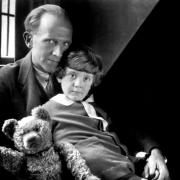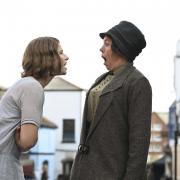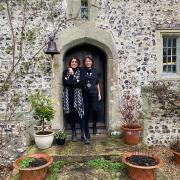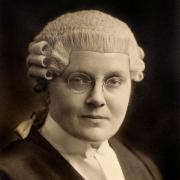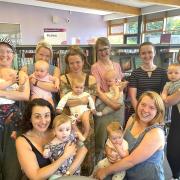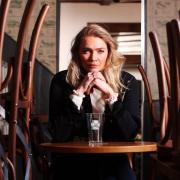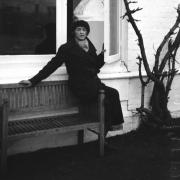At 15, she was sleeping rough on the streets. Today, she’s one of the UK’s leading firefighters. Meet Sabrina Cohen-Hatton, the new head of West Sussex Fire and Rescue Service

Sabrina Cohen-Hatton, the new chief fire officer of West Sussex Fire and Rescue Service, doesn't look like your average firefighter. In case you hadn't noticed, she's female, and, at 5ft 1in, quite petite at that. She's also mixed race, which, again, doesn't fit the traditional Fireman Sam profile. But that's just the way she likes it because she has made it her mission to combat stereotypes in the service.
"If you ask people to imagine a firefighter, they picture some tall, dark, hunky calendar model, but the reality, I'm afraid - and I say this with love - is that I've seen more firefighters who look like Ed Balls than Tom Hardy," she says, breaking into a laugh. "Joking aside, it does have an impact because, selfishly, as a senior fire brigade leader, I want the best of the best. Being a firefighter is tough, and I need to be able to choose the best out there, not just the best of the best from those who might think about it because the stereotype appeals to them."
Sabrina is only 36, but she's already one of the most senior firefighters in the country. As a deputy assistant commissioner in the London Fire Service at the time of the Grenfell disaster, it fell to her to debrief crews as they came off duty the next morning, and deal with the aftermath. She also helped oversee the fire service's response to the Westminster and Finsbury Park terror attacks.
Since then she has become something of a troubleshooter, drafted in to fight fires in the metaphorical sense. Her previous posting was as interim deputy chief fire officer at Surrey Fire and Rescue, and now she's crossed the border into West Sussex - both troubled services that have received a drubbing in a recent internal inspection report.
Overall, the inspectorate noted that West Sussex "required improvement", but more worryingly they singled out the service's inadequacy in protecting the public through fire regulation, and ensuring fairness and promoting diversity. In layman's terms, they highlighted accusations of bullying among staff due to gender or race.
Who better to parachute in than Sabrina, who, as a female firefighter from an ethnic background, has become something of a poster girl. She was even a recent guest on Radio 4's Desert Island Discs, where she gave such a bravura performance that it almost sounded like a pitch for the top job in the organisation.
When I ask how ambitious she is, she says, "Good question," then assures me she has made a commitment to West Sussex and it's important she sees through the improvement journey. On a practical level, she wants to get to the heart of the report's criticisms by talking to staff and unpicking the problems.
"I have to reposition the organisation so that people feel empowered enough to make a suggestion, and know it's going to be listened to," she says. "I want people to come to work and feel psychologically safe. A report is being written that will articulate all the findings and it will come directly to me."
When she says she understands firsthand the challenges that staff are facing, she really means it. She was rejected 31 times before she was accepted into the South Wales Fire and Rescue Service at the age of 18. She was the first woman in her station, the first in her division, but it came at a price. "For the first six months, I wasn't even allowed my own name. I was called something really derogatory," she says. Her male colleagues blanked her, talked about her behind her back and filled her boots with rubbish. "They made no secret of the fact that they didn't think it was a place for a woman."
It's scarcely surprising that she's determined to stamp out "toxic masculinity" in the service, though she stresses she's had far more positive experiences than negative ones. After all, her husband, Mike, is a firefighter.
How did she endure those tough, early years? Well, Sabrina has suffered much worse. She was just nine when her father died. He had travelled to the UK from Israel without a penny in his pocket. A maths genius with a photographic memory, he'd made a small fortune winning at cards in London casinos.
That's where he met her mother, a Playboy Bunny and croupier. They fell in love, moved to Cardiff, started a pizzeria business and had two children. Then, when Sabrina was three, her childhood was derailed. "Dad was diagnosed with a brain tumour and it affected his behaviour. Not only did we watch his physical deterioration with cancer, we saw his cognitive decline. It took away a part of his soul."
Even to this day, her mother sleeps on the sofa where he died. Her grief affected her mental health, the family business failed and they lived in abject poverty. The children were placed on the 'at risk' register and social workers visited regularly, but at the age of 15 Sabrina took the difficult decision to sleep rough to escape the volatility at home. "I don't blame my mother in any way because she was ill," she says.
She lived in derelict buildings and shop doorways, and felt so hungry that she scavenged bins outside burger joints while people looked on in disgust. One night, she woke up to find a drunk urinating over her sleeping bag.
Sabrina had never felt more alone. "It's funny because if someone falls over in the street, everyone rushes to pick them up. But if people see someone on the pavement, with no food in their belly and no hope, they just walk past like they're not there." She realised she'd hit rock bottom when one of her teachers spotted her selling the Big Issue and crossed the road to avoid her. Remarkably, she still passed her GCSEs with flying colours.
She tried to get help with housing, but was told she wasn't a priority because she was already homeless. It was only through selling the Big Issue that she clawed her way onto the housing ladder, saving enough for a deposit on a tiny rented flat. Now she's an ambassador for the magazine, helping to give people on the fringes of society a voice.
Sabrina must pinch herself when she looks at her loving husband and nine-year-old daughter Gabriella, and reflect on what might have been - and for more reasons than one. Early in her career she was part of a crew attending an incident where a firefighter had been severely injured, and there was a one-in-four chance it was her husband.
"It turned out not to be him, and I felt this huge sense of relief, but also this great sense of guilt because I felt I had wished it on someone else, and that someone else wasn't just a colleague, but a friend."
To cope, she studied ways of reducing human error to make firefighters safer, and was horrified to discover 80 per cent of accidents across all industries were caused by human error. It spurred her on to read a part-time PhD in behavioural neuroscience, looking at risk-critical decision making, while continuing to work full-time in the fire service.
Her award-winning findings have helped shape national policy and formed the basis for her acclaimed book, The Heat of the Moment, in which, for the first time and with considerable trepidation, she also shared her remarkable story of resilience. She has since become something of a media darling and her book has even been optioned for television.
"It took me more than 20 years to find the courage to speak about my turbulent background, but the reaction has been amazing," she says. "What has really touched me is the amount of people who have reached out and said they've had a similar experience which they've never spoken about. Even if I've only helped a small number to think differently about themselves and what they've achieved, then it will have all been worthwhile."




